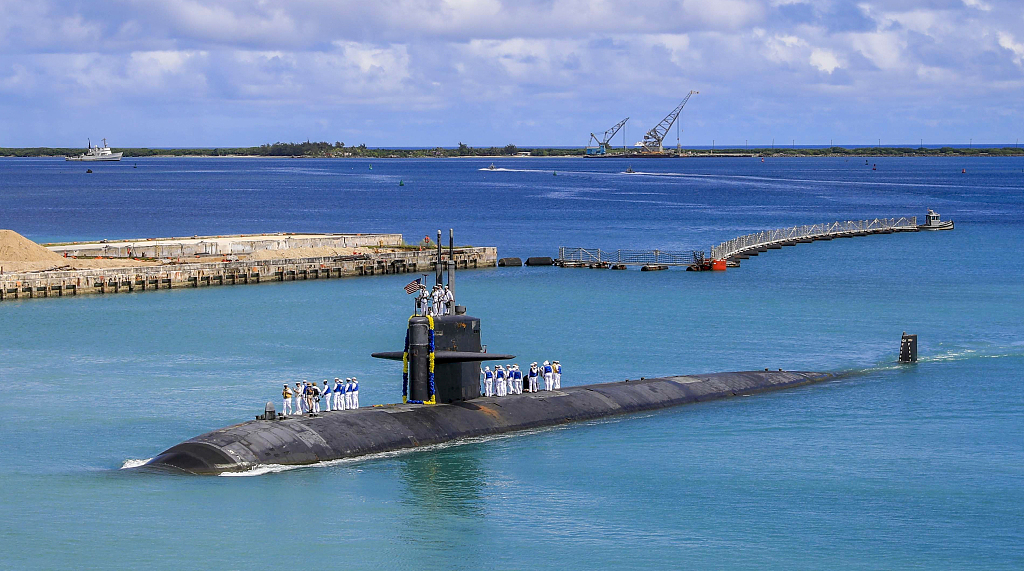
An empty street in Sydney, Australia, July 28, 2021. /Xinhua
An empty street in Sydney, Australia, July 28, 2021. /Xinhua
Editor's note: Hamzah Rifaat Hussain, a former visiting fellow at the Stimson Center in Washington and former assistant researcher at the Islamabad Policy Research Institute, is a TV anchor at Indus News in Pakistan. The article reflects the author's opinions and not necessarily those of CGTN.
The impractical, escalatory and provocative nature of the AUKUS alliance is being reignited by both Canberra and London in a joint statement released after the video meeting between British Prime Minister Boris Johnson and his Australian counterpart Scott Morrison on February 17.
It is now an established fact that AUKUS denigrates principles of non-proliferation by supplying nuclear-armed submarines to Australia even though Canberra is a signatory to the Treaty on the Non-Proliferation of Nuclear Weapons (NPT). The trilateral alliance, however, is adamant in implementing nefarious designs, which target China, yet the entire attempt at "reinforcing peace in the region" is hypocritical.
Firstly, there is little merit to the claims of either Johnson, where the UK's diplomacy on Ukraine is preying on alarmist, insensitive and crass narratives, or Morrison, who has chosen to proliferate and violate the central tenets of the NPT by accepting a pledge of $34 million to deepen the pseudo-security pact. As per Johnson, the funds will not be used for freedom of navigation but to strengthen resilience in areas such as cyberspace, state threats and maritime security despite the fact that AUKUS already has a nuclear component to it. These latest funds enshrined in a joint statement clearly deal with militarization of the Asia Pacific, not de-escalation. This is despite the fact that both Johnson and Morrison claim that the alliance is to promote an open, inclusive and resilient Asia-Pacific.
The truth is that AUKUS was already a non-starter the moment ASEAN member states voiced concern over its escalatory tendencies and distanced themselves from such recklessness. It was also badly negotiated considering the alliance infuriated France, as Paris found out that its own diesel electric submarine contract with Australia was suspended. Now Australia's quest of arming submarines with conventional weapons is followed by Canberra's option of whether to go for a fleet based on American or British nuclear submarines. There also exists ambiguity over whether the doctrine adopted, once nuclear submarines are operational, would be based on full spectrum deterrence or minimal credible deterrence, which heightens the risk of miscalculations. None of this however, has been factored in by any of the respective leaderships, who are adamant that tackling China's perceived expansionism is the right course of action.

The Los Angeles-class fast attack submarine USS Oklahoma City (SSN 723) returns to U.S. Naval Base in Guam, August 19, 2021. /VCG
The Los Angeles-class fast attack submarine USS Oklahoma City (SSN 723) returns to U.S. Naval Base in Guam, August 19, 2021. /VCG
Augmenting threats and presenting alarmist narratives by the West on security have already been exposed in Ukraine where the impending threat of a Russian invasion has provided a premise for NATO to adopt offensive doctrines. The case with investing in AUKUS is not too different as Australia will become the only non-nuclear weapons state which has acquired nuclear powered submarines as part of its offensive strategy, which includes leveraging its membership of the informal Quad Security Dialogue to cement security cooperation. With AUKUS, Australia has clearly become the aggressor, with the U.S. and the UK becoming facilitators as deliberate attempts at expanding an arms race aimed at encircling China continues unabated.
Hence, such joint statements should be interpreted as a joint resolve to compromise Asia Pacific's security, with nuclear weapons lacking clearly defined doctrines and ambiguous military blueprints becoming routine. Attempts at reinforcing AUKUS are actually grounded in American proclivities of outcompeting China at sea, with Chief of Naval Operations Admiral Mike Gilday having reached out to countries such as France and South Korea to ensure fourth generational interoperability of carrier-based aircraft to counter China. Additionally, commander of the submarine forces Rear Admiral Jeffrey Jablon, at a panel presentation during the WEST 2022 conference, said that AUKUS would enhance solid partnerships with the Royal Australian Navy on submarines, hinting at the swift transfer of nuclear weapons to Canberra. This constitutes the Biden doctrine, which is grounded in containing China militarily, and the decision of the UK and Australia as allies to reignite AUKUS should be considered no different.
With American offensive doctrines and an overt nuclear dynamic to the AUKUS alliance in 2022 in full swing, the decision by the UK and Australia to reignite this provocative security pact should be interpreted as yet another attempt to endanger maritime peace in the Asia Pacific.
(If you want to contribute and have specific expertise, please contact us at opinions@cgtn.com.)

